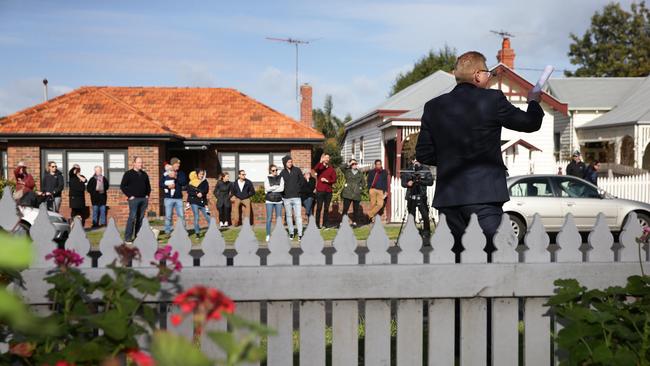Banking armageddon if class actions and stricter regulation accompany property plunge: UBS
Australia is at risk of a deep recession if a flood of class actions hit the banks as housing prices plunge, warns UBS.

Australia is at risk of a doomsday scenario of a deep recession, a flood of class actions against the major banks by borrowers sold into unaffordable mortgages and house prices sinking 30 per cent, according to a bearish assessment of the deteriorating outlook for the financial system by investment bank UBS.
UBS analyst Jonathan Mott, who has warned for the past two years of deep structural problems in the $1.6 trillion housing market, paints a picture of a potential “hard landing” as worst of his five possible scenarios for the major banks.
“The outlook for the banks has not been as challenged since at least 2008,” Mr Mott told clients in a research note on Tuesday.
“We believe the rapidly deteriorating housing market is a signal of even tougher times ahead. The housing credit squeeze experienced over the last six months is expanding, with owner occupied lending (flow) now also falling,” Mr Mott said.
Under more benign scenarios where the recommendations of the royal commission are “effectively watered down” and bank executives continue to be paid based on how much profit they can make, Mr Mott said the housing market already may be through the worst.
In another, the banking sector could “muddle through” a “relatively hard” royal commission fallout that would represent a “rap across the knuckles” for the banks, with house prices falling a further 5 per cent as Labor’s proposed negative gearing and capital gains tax reforms have a “muted impact” on the housing market.
However, the three more bearish scenarios foresee a housing correction where prices fall more than 10 per cent after the banking sector is forced to strictly comply with responsible lending laws at the same time the sector is forced to shell out more revenue in customer remediation for previous bad conduct.
The major banks and large wealth management companies are already facing about $2 billion in customer remediation over a string of scandals and are staring down the barrel of a number of class actions.
Mr Mott said with the Australian Prudential Regulation Authority set to force banks to restrict loans sold to heavily indebted borrowers taking out loans worth more than six times their income, damaged sentiment in the property market could spark a 20 per cent fall in house prices in Sydney and Melbourne.
While in his fifth scenario, the major banks are pummelled by borrowers, now in negative equity, launching legal cases who claim their mortgage was mis-sold.
Speaking to The Australian, Maurice Blackburn financial services Principal Josh Mennen said his law firm had been inundated with borrowers looking to make a claim after being sold into an interest-only loan unaware, and were now facing steeper mortgage repayments at the end of the interest-only period.
He also said borrowers were seeking to make claims against banks that had low-balled their expense information when applying for loans, and against brokers who had supplied dodgy information to lenders.
“The past decade has been full of free and loose lending by the major banks,” Mr Mennen said. “I am very concerned about any message being sent to the banks to continue with their previous status quo. That is tantamount to telling them they should have an operating model that allows for irresponsible lending,’ he said.
Mr Mott said the broader market seemed to believe that the banking sector would “muddle through” the current credit squeeze, but that he was a bit more wary of the future of the financial sector.
“We remain cautious the banks despite the share price correction and believe the risk of the current housing credit squeeze turning into a credit crunch is real and is rising,” he said.



